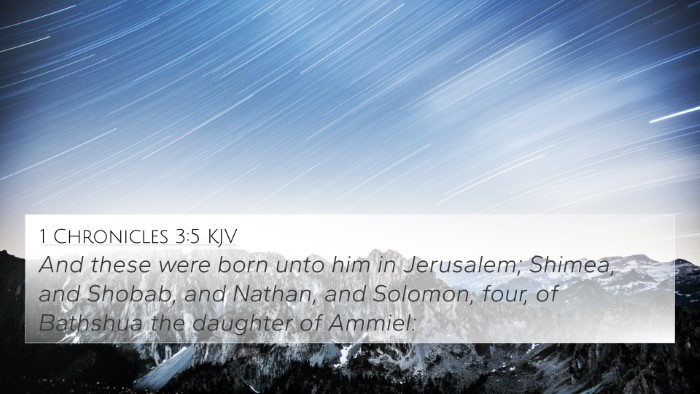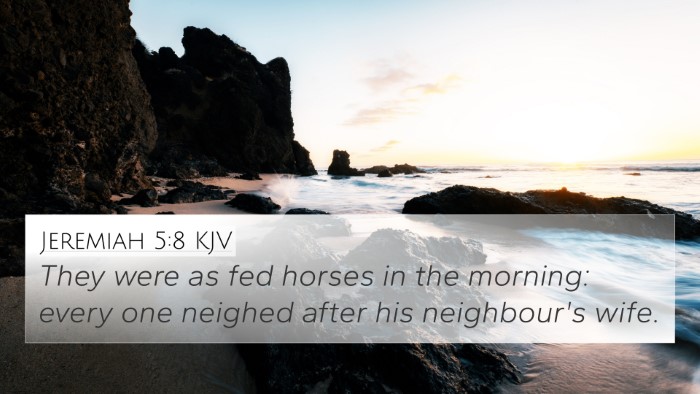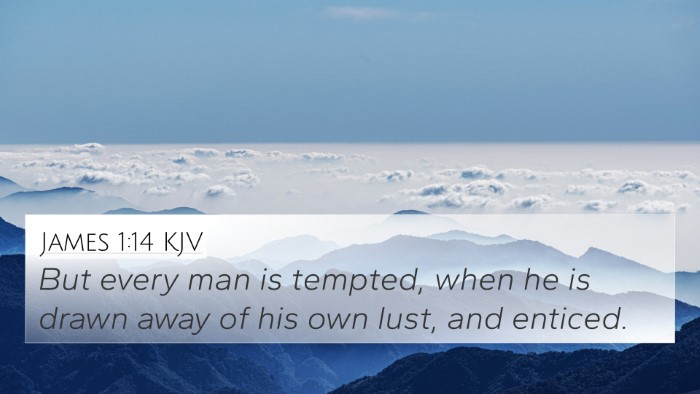Understanding 2 Samuel 11:3
2 Samuel 11:3 states: "And David sent and inquired after the woman. And one said, Is not this Bathsheba, the daughter of Eliam, the wife of Uriah the Hittite?" This verse is pivotal in the narrative of David’s moral failing and the consequences that follow. The significance of this passage unfolds through a careful exploration of its meaning and its interconnections with other biblical texts.
Verse Context and Background
The narrative of David and Bathsheba, beginning in this verse, serves as a cautionary tale regarding temptation, lust, and the consequences of sin. David, having seen Bathsheba bathing, is struck by her beauty and desires her, which leads to a series of sinful actions. This verse reflects David's inquiry about Bathsheba, showing his initial curiosity that spirals into greater sin.
Commentary Insights
-
Matthew Henry:
Henry notes that David’s inquiry signifies the first step towards his moral downfall. By seeking knowledge about Bathsheba, David displayed a willingness to pursue that which is forbidden. This pretense of innocent inquiry masked the impending sin that would engulf him.
-
Albert Barnes:
Barnes emphasizes that David 'sent' for information, highlighting his agency in the matter. His role as king grants him power, yet this power leads to a misuse of authority. The mention of Bathsheba being the wife of Uriah further underscores the gravity of David’s interest, marking her as off-limits.
-
Adam Clarke:
Clarke discusses the identity and background of Bathsheba, framing her as a significant figure within David's story. He draws attention to her relation to Eliam and Uriah, noting that these connections illustrate both familial ties and loyalty, intensifying the tragic outcome of David’s actions.
Thematic Connections
This verse connects with several key themes throughout the Bible, particularly those focusing on temptation, authority, and the consequences of sin. Here are some themes and connections to other biblical texts:
- Temptation and Sin: James 1:14-15 discusses how desire leads to sin, paralleling David’s initial fascination with Bathsheba.
- Abuse of Power: Isaiah 5:20 condemns those who call evil good, mirroring David's justifications for his actions.
- Consequences of Sin: Galatians 6:7 reminds that one reaps what they sow, which becomes evident in the repercussions David faces.
- Family and Loyalty: Proverbs 6:32-33, emphasizing the destruction that comes from adultery, thereby connecting to Uriah's loyalty.
- Repentance and Forgiveness: Psalm 51, written by David after his sin, depicts his recognition of guilt and need for forgiveness.
- Divine Judgment: 2 Samuel 12:9-10 reveals Nathan's confrontation and subsequent judgment upon David for his actions.
- Righteousness: Matthew 5:28 speaks to the importance of purity in thought, linking back to the internal process that leads David to sin.
Cross-References and Controlled Themes
The exploration of 2 Samuel 11:3 can be enriched through cross-referencing with other scripture that discuss similar themes:
Related Bible Cross-References
- 2 Samuel 11:2 - Sets the scene for David's desires.
- Proverbs 7:25-27 - Warn against the enticement of temptation.
- Matthew 27:35 - Discusses betrayal, akin to Uriah's loyalty versus David's betrayal.
- 1 Corinthians 10:12 - Encourages vigilance against falling into sin.
- Psalm 32:3-5 - Illustrates the burden of unconfessed sin, linking back to David's experience post-sin.
- John 8:34 - Reflects on the nature of sin and its dominion over those who yield to it.
- Job 31:1-4 - Job’s resolution to purity parallels David's failure.
Conclusion
2 Samuel 11:3 is a rich verse, laden with the weight of David's choices that unfold throughout the chapter. Through the lens of various commentaries and cross-referencing scriptural themes, one can gain a deeper understanding of the implications that arise from this moment. It serves as both a warning and a profound lesson on the nature of desire, accountability, and the importance of righteousness in one's life. The narrative that follows this inquiry about Bathsheba highlights the grievous results of succumbing to temptation and the dire need for repentance and divine mercy.








